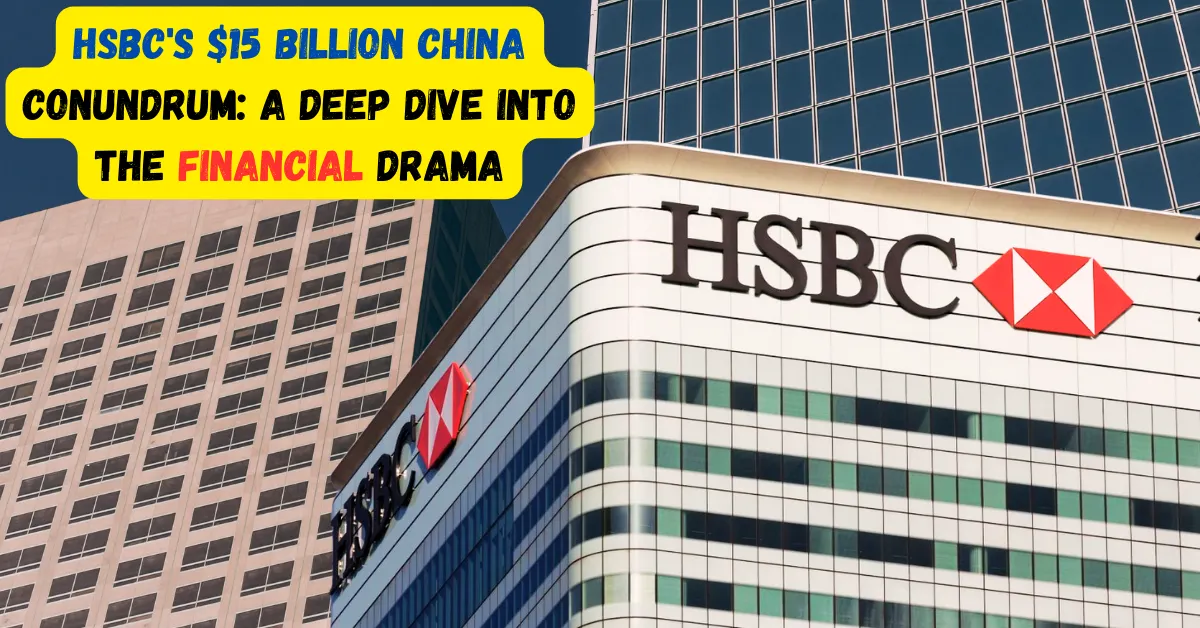
Navigating HSBC’s $15 Billion Conundrum in China
Unraveling HSBC’s Strategic Investment
HSBC Holdings finds itself entangled in a $15 billion conundrum in China, stemming from its substantial stake in Bank of Communications (BoCom), a position held since 2004. While other Western banking giants have divested from similar holdings, HSBC, Europe’s largest bank, maintains its approximately 19% interest, citing strategic importance for its Asian growth ambitions.
Valuation Discrepancy: A Lingering Challenge
A significant challenge for HSBC revolves around the valuation of its BoCom stake. Despite HSBC’s internal valuation pegging it at $23.9 billion in August, a stark disparity exists when compared to BoCom’s stock price. This valuation misalignment, described as a “long-festering problem” by research provider Autonomous, raises questions about potential write-downs and their implications.
Navigating Unique Geopolitical Waters
HSBC’s conundrum goes beyond financial intricacies; it delves into the bank’s unique position straddling the Chinese political system and the U.S. dollar-based political system. Managing Director of Orient Capital Research, Andrew Collier, notes that HSBC’s delicate balance reflects its commitment to growth in mainland China and Asia amidst geopolitical tensions.
Limited Options Amidst Ambitious Plans
HSBC’s options regarding its BoCom stake are constrained by the need for Chinese government approval for licenses crucial to its expansion in China. Analysts argue that any attempt to sell the stake could risk upsetting Chinese authorities, potentially jeopardizing HSBC’s growth plans in the region.
Implications of a Potential Write-down
Considering a potential impairment of the BoCom stake, analysts warn of adverse effects on HSBC’s earnings. A write-down to match the stock price could slash the bank’s tangible book value by 7%, impacting its headline profit. Despite potential setbacks, HSBC emphasizes adherence to rigorous accounting processes, asserting that management lacks discretion in impairment decisions.
The Geopolitical Tightrope
HSBC’s commitment to its BoCom stake, despite challenges, underscores its strategic alignment with the Chinese market. Exiting such a significant investment could be interpreted as a lack of faith in the Chinese economy, a narrative HSBC aims to avoid. The geopolitical tightrope becomes evident as the bank balances its presence in Asia against global tensions.
Financial Resilience Amidst Challenges
While a substantial write-down would dent HSBC’s reputation, its core financial metrics might remain resilient. Complex banking rules mandate a deduction of over $16 billion from the bank’s core equity Tier 1 capital due to the BoCom stake, a measure that could offset the impact of a potential write-down.
Historical Divergence: HSBC vs. International Banks
HSBC’s steadfast retention of its BoCom stake contrasts with the trend among other international banks. Post-global financial crisis, institutions like Bank of America, Citigroup, and Goldman Sachs divested their stakes in Chinese lenders, driven by regulatory changes and a lack of increased access to China’s economy.
Resource-sharing Agreement and Dividends
HSBC’s relationship with BoCom extends beyond equity ownership, featuring a resource-sharing agreement and two board seats. Over the past two years, HSBC has received $1.44 billion in dividends, emphasizing the ongoing financial ties between the two entities.
Navigating Economic Challenges in China
BoCom, like other Chinese banks, faces challenges such as lower interest rates and record-high savings levels. The bank’s recent profit decline and narrowing net interest margin underscore the broader economic headwinds in China, impacting both domestic and international stakeholders.
Conclusion
In navigating the intricate landscape of its $15 billion conundrum in China, HSBC grapples with valuation disparities, geopolitical considerations, and the delicate balance between global ambitions and regional growth. As the bank treads carefully to preserve its strategic foothold in Asia, the unfolding dynamics of the BoCom situation present a compelling narrative at the intersection of finance, geopolitics, and strategic decision-making.





